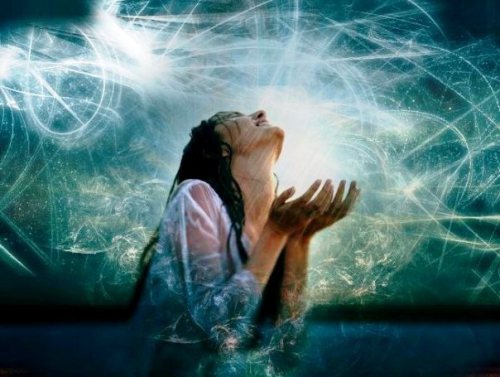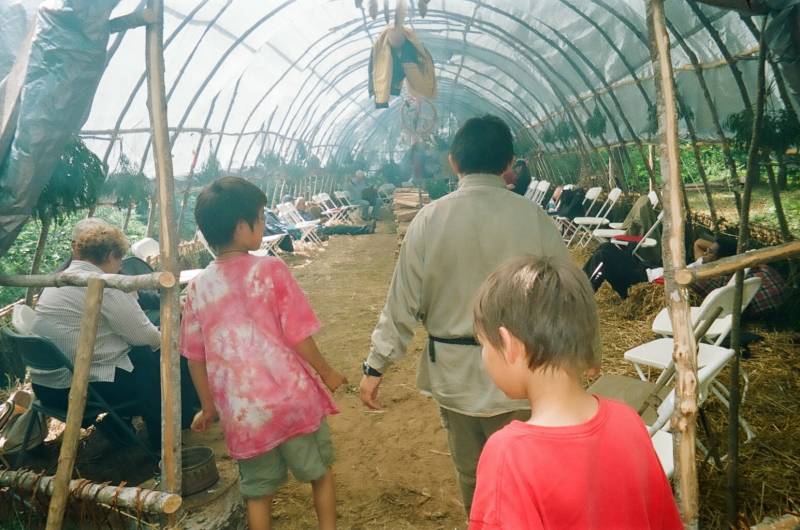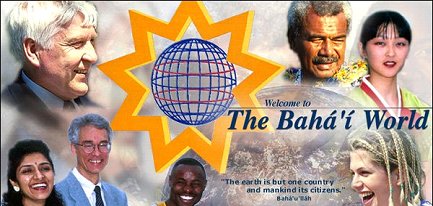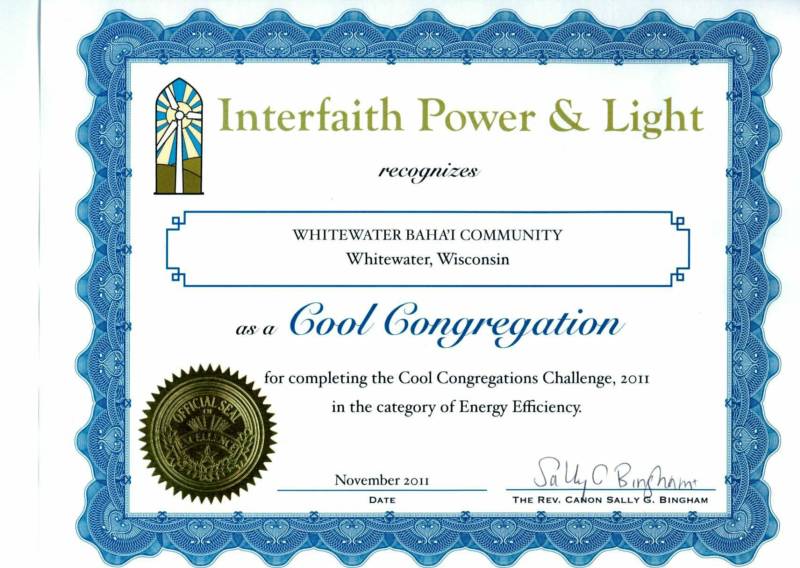***Who are Baha'is? ***
Our family is Baha'i. Baha'is are people who try to live a Baha'i life. Baha'i is a religion, social beliefs, a spiritual path that incorporates the "Middle Way," and a way of life.
But just following Baha'i religious traditions or believing in Baha'i-inspired social principles won't make you a true Baha'i. You have to try every day to live these traditions and principles while traveling the "Middle Path."
Some of the things you have to do are to help others, including animals & the natural environment, treat people fairly no matter who or what they are, keep learning and developing into a better person every day, and find your place in or your relationship with the World of Creation - that unknowable thing we call God.
Learn more about Baha'is and the Baha'i way of life at
www.bahai.us (USA Baha'i website)
*********************
Photos below taken at
Native American Baha'i conference -
Lac Du Flambeau Reservation in Northern Wisconsin
Baha'i View of Humanity in this Turbulent World
(Baha'i International Community- excerpts from the Universal House of Justice letter November-2013)
"Humanity...is approaching today the crowning stage in a millennia-long process which has brought it from its collective infancy to the threshold of maturity - a stage that will witness the unification of the human race. Not unlike the individual who passes through the unsettled yet promising period of adolescence, during which latent powers and capacities come to light, humankind as a whole is in the midst of an unprecedented transition. Behind so much of the turnulence and commotion of contempory life are the fits and starts of a humanity struggling to come of age....Bahai's are encouraged to see in the revolutionary changes taking place in every sphere of life the interaction of two fundamental processes. one is destructive in nature, while the other is integrative; both serve to carry humanity, each in its own way, along the path leading towards its full maturity.... Though devastating in their effects, the forces of disintegration tend to sweep away barriers that block humanity's progress, opening space for the process of integration to draw diverse groups together and disclosing new opportunities for cooperation and collaboration. Baha'is, of course, strive to allign themselves, individually and collectively, with forces associated with the process of integration, which, they are confident, will continue to gain in strength, no matter how bleak the immediate horizons....
That humanity constitutes a single people is a truth that, once viewed with skepticism, claims widespread acceptance today. The rejection of deeply ingrained prejudices and a growing sense of world citizenship are among the signs of this heightened awareness. Yet, however promising the rise in collective consciousness may be, it should be seen as only the first step....The (Baha'i) principle of the oneness of humankind...asks not merely for cooperation among people and nations. It calls for a complete reconceptualization of the relationships that sustain society. The deepening environmental crisis, driven by a system that condones the pillage of natural resources to satisfy an insatiable thirst for more, suggests how entirely inadequate is the present conceptualization of humanity's relationship with nature; with the the accompanying rise in the systematic exploitation of women and children worldwide, makes clear how pervasive are the misbegotten notions that define relations within the family unit...the concentration of material wealth in the hands of a minority of the world's population gives an indication of how fundamentally ill-conceived are relationships among many sectors of what is now an emerging global community.
What should be stated plainly here is that Baha'is do not believe the transformation thus envisioned will come about exclusively through their own efforts. Nor are they trying to create a movement that would seek to impose on society their vision of the future. Every nation and every group - indeed, every individual - will, to a greater or lesser degree, contribute to the emergence of the world civilization towards which humanity is irresistibly moving....It is with such thoughts in mind that Baha'is enter into collaboration... with an increasing number of movements, organizations, groups and individuals, establishing partnerships that strive to transform society and further the cause of unity, promote human welfare...(yet) it is not possible to build enduring unity through endeavors that require contention or assume that an inherent conflict of interests underlies all human interactions, however subtly...(Baha'is) are not to regard any joint undertaking as an occasion to impose religious convictions. Self-righteousness and other unfortunate manifestations of religious zeal are to be utterly avoided. Baha'is do, however, readily offer to their collaborators the lessons they have learned through their own experience...(Baha'is have) a revised conception of power, freed from the notion of dominance with the accompanying ideas of contest, contention, division, and superiority; ... its commitment to a vision of a world that, benefitting from humanity's rich cultural diveristy, abides no lines of separation....
Baha'is do not seek political power. They will not accept political posts in their respective governments, whatever the particular system in place, though they will take up positions which they deem to be purely administrative in nature. They do not affiliate themselves with political parties, become entangled in partisan issues, or participate in programs tied to the divisive agendas of any group or faction. At the same time, Baha'is respect those who, out of a sincere desire to serve their countries, choose to pursue political aspirations or to engage in political activity. The Baha'i approach...of noninvolvement in such activity is not intended as a statement expressing some fundamental objection to politics in its true sense.... Baha'is view government as a system for maintaining the welfare and orderly progress of a society, and they undertake...to observe the laws of the land in which they reside, without allowing their inner religious beliefs to be violated.... This does not mean (Baha'is)... make no distinction between just and tyrannical rule....Wherever they reside, Baha'is endeavor to uphold the standard of justice, addressing inequities directed towards themselves or toward others, but only through lawful means available to them, eschewing all forms of violent protest....Guarded against competing interest of nations and political parties, the Baha'i community is thus able to build its capacity to contribute to processes that promote peace and unity."
Some of my favorite Baha'i quotes:
"A Bahá’í …must therefore develop the ability to learn everything from those around him…
but always relating what he hears to the Bahá’í teaching …"
(Universal House of Justice
"Wellspring of Guidance" p. 95–96)
"Prayer need not be in words, but rather in thought and attitude. But if this love and
this desire are lacking, it is useless to try to force them.
Words without love mean nothing. If a person talks to you as an unpleasant duty,
with no love or pleasure in his meeting with you, do you wish to converse with him?"
(Report of 'Abdu'l-Bahá's words as quoted in J. E. Esslemont,
"Bahá'u'lláh and the New Era" p. 94)
"The primary, the most urgent requirement is the promotion of education.
It is inconceivable that any nation should achieve prosperity and success unless
this paramount, this fundamental concern is carried forward.
The principal reason for the decline and fall of peoples is ignorance."
(Abdu'l-Baha
"The Secret of Divine Civilization" p. 108)
"In every period war has been waged in one country or another
and that war was due to either religious prejudice,
racial prejudice,
political prejudice or
patriotic prejudice.
It has therefore been ascertained and proved that all prejudices are destructive of the human edifice."
( 'Abdu'l-Baha,
"Baha'i World Faith" p. 286)
"Violence against women is a yardstick by which one can measure the violation of all human rights. It can be used to gauge the degree to which a society is governed by aggressivity, dominated by competition and ruled by force."
(Bahá’í International Community
Ending Violence Against Women
Statement to 51st session of UN Commission on Human Rights
March 1995)
"Detachment does not consist in setting fire to one's house,
or becoming bankrupt or throwing one's fortune out of the window,
or even giving away all of one's possessions.
Detachment consists in refraining from letting our possessions possess us."
(Abdu'l-Baha
"Divine Philosophy" p. 135)
"... 'Abdu'l-Bahá told them a story which made them laugh....
It was 'good to laugh', He told them;
'laughter is a spiritual relaxation'."
(H.M. Balyuzi,
"Abdu'l-Baha - The Centre of the Covenant" p. 31)
"Meditation is the key for opening the doors of mysteries. In that state man abstracts himself: in that state man withdraws himself from all outside objects; in that subjective mood he is immersed in the ocean of spiritual life and can unfold the secrets of things-in-themselves."
(Abdu'l-Baha - "Paris Talks" p. 175)
"Humanity’s crying need will not be met by a struggle among competing ambitions or by
protest against one or another of the countless wrongs afflicting a desperate age.
It calls, rather, for a fundamental change of consciousness, for a wholehearted embrace of
Bahá’u’lláh’s teaching that the time has come when each human being on earth must learn to accept
responsibility for the welfare of the entire human family."
(The Universal House of Justice statement - May 2001)
"We cannot segregate the human heart from the environment outside us
and say that once one of these is reformed everything will be improved.
Man is organic with the world.
His inner life moulds the environment and is itself also deeply affected by it.
The one acts upon the other and every abiding change in the life of man is the result
of these mutual reactions....
If we desire therefore the good of the world we should strive to spread
those teaching and also practise them in our own life.
(Shoghi Effendi in a letter to an individual believer dated 17 Februray, 1933)
"Therefore strive that your actions day by day may be beautiful prayers. Turn towards God, and
seek always to do that which is right and noble. Enrich the poor, raise the fallen, comfort the
sorrowful, bring healing to the sick,reassure the fearful, rescue the oppressed, bring hope to the
hopeless, shelter the destitute!"
(Abdu'l-Baha - "Paris Talks" p. 80)
Who are Baha'is?








